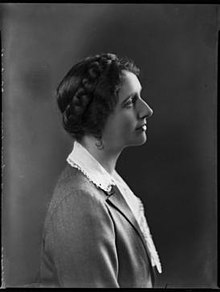Juliet Rhys-Williams
Juliet Rhys-Williams | |
|---|---|
 | |
| Born | Juliette Evangeline Glyn 17 December 1898 |
| Died | 18 September 1964 (aged 65) |
| Occupation(s) | Politician, writer |
| Spouse | |
| Children | Four |
Dame Juliet Evangeline Rhys-Williams, Lady Rhys-Williams, DBE, DStJ (née Glyn; 17 December 1898 – 18 September 1964) was a British writer and a Liberal Party politician who previously joined the Liberal National Party.
Early life
As Juliette Evangeline Glyn, she was the daughter of Clayton Louis Glyn, a barrister, and his wife Elinor Glyn. She was educated in Eastbourne, and joined the Voluntary Aid Detachment aged 15.[3]
She began her career as private secretary to the Director of Training and Staff Duties at the Admiralty in 1918, becoming private secretary to the Parliamentary Secretary, Ministry of Transport, 1919–1920. She was working for Sir Rhys Rhys-Williams, 1st Baronet, and they were married in 1921. Subsequently she was often known as Lady Williams.[3]
Political career
She contested the 1938 Pontypridd by-election as a Liberal National candidate. Her candidacy attracted popular attention because she decided to stand when her baby daughter was just 8 days old.[4] As a supporter of the National Government she received the formal support of the local Conservative Association.[5] In a two-way contest she polled 40% of the vote. From then on her political activities were in support of the official Liberal Party. In 1943 she became Honorary Secretary of the Women's Liberal Federation. In 1944 she became Chairman of the Publications and Publicity Committee of the Liberal Party, serving for two years. She was a member of the Liberal Party's ruling Council.[6]
Her ideas on income tax reform were published by the Liberal Party. She contested the 1945 general election as the Liberal Party candidate for Ilford North.[7] She resigned after a disagreement on policy matters with her party's leaders.[3]
Lady Rhys-Williams was a member of the Beveridge Committee and unsuccessfully proposed a Basic Income in the form of a negative income tax, as an alternative to the main, insurance based recommendation of the Beveridge Report.[6][8]
Interests
Lady Rhys-Williams was interested in film, and involved in the development of colour film, taking out a patent in 1930, with Sydney George Short.[9]
Family
Sir Rhys and Lady Rhys-Williams had four children; Brandon Rhys-Williams was the second son, and inherited the baronetcy, his elder brother having died in 1943.[3]
Publications
- Doctor Carmichael (1940), London: Herbert Jenkins
- Something to Look Forward to; a Suggestion for a New Social Contract (1943), London: Macdonald
- Family Allowances and Social Security (1944), Liberal Publication Department
- Taxation and Incentive (1953), New York: Oxford University Press
- A New Look at Britain's Economic Policy (1965), Harmondsworth: Penguin
References
- ^ "Registration of birth". FreeBMD. Retrieved 22 August 2022.
- ^ "Registration of death". FreeBMD. Retrieved 22 August 2022.
- ^ a b c d Nicoll, William. "Williams, Dame Juliet Evangeline Rhys". Oxford Dictionary of National Biography (online ed.). Oxford University Press. doi:10.1093/ref:odnb/45495. (Subscription or UK public library membership required.)
- ^ Hull Daily Mail, 7 January 1938
- ^ Hull Daily Mail, 3 February 1938
- ^ a b Sloman, Peter (2015). Beveridge's rival: Juliet Rhys-Williams and the campaign for basic income, 1942-55 (PDF) (Report). New College, Oxford. Retrieved 26 April 2017.
- ^ Rhys Williams, Juliet Evangeline, (Lady Rhys Williams), Who Was Who, A & C Black, an imprint of Bloomsbury Publishing plc, 1920–2014; online edn, Oxford University Press, 2014 ; online edn, April 2014 accessed 28 Sept 2014[permanent dead link]
- ^ Fitzpatrick, Tony (1999). Freedom and Security: an introduction to the basic income debate (1. publ. ed.). New York: St. Martin's Press. p. 42. ISBN 978-0-312-22313-7.
- ^ Vincent L. Barnett; Alexis Weedon (29 April 2016). Elinor Glyn as Novelist, Moviemaker, Glamour Icon and Businesswoman. Taylor & Francis. p. 182 note 62. ISBN 978-1-317-14514-1.
